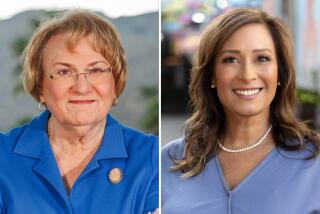Local Elections : STATE SENATE : 40th District : Easy Deddeh Win Seen as GOP Fields 2 Candidates
SACRAMENTO — If things had all gone his way, Democratic state Sen. Wadie Deddeh of Chula Vista would be making his bid for reelection to the state Senate as Democratic Caucus chairman--a plum leadership post that would have attested to a level of respect earned during 20 years in Sacramento.
But circumstances interceded.
Had things gone the way Republican strategists had wanted, Deddeh would be facing a well-financed campaign of a well-known San Diego political figure like Supervisor Brian Bilbray, Chula Vista Mayor Greg Cox or San Diego Councilman Uvaldo Martinez.
But again, circumstances interceded.
So it appears that, in his first reelection campaign for the Senate seat he captured four years ago, Deddeh, 65, will see things go pretty much the way they always did the eight times he was elected--handily--to the Assembly.
With better-known Republican political figures having all shied away from a contest, Deddeh should have a relatively easy time against either San Diego Police Lt. William M. (Bill) Hoover or former Border Patrol union spokeswoman Muriel Watson in November.
Both Republicans say they are serious candidates who should be able to score points with the district’s unabashedly conservative voters.
But even after an aggressive registration drive, Republicans have 54,000 fewer voters in the district than do Democrats. And, Deddeh, an Iraqi immigrant who has served in the Legislature longer than any other San Diego representative, has been able to win in past elections by margins that far exceed even those suggested by the lopsided registration totals.
The 40th Senatorial District stretches from the Mexican border to North Park and Normal Heights, then from the center of San Diego Bay inland to Lemon Grove, Spring Valley and the Lower Otay Reservoir.
Although he is unopposed in the June 3 primary, the most recent campaign finance reports showed Deddeh with more than $133,000 in his campaign war chest in mid-March, compared to Hoover’s $146 and Watson’s zero.
Both Republican primary candidates say they have raised more money since those reports were filed with election officials. Watson says she has raised about $2,000; Hoover refuses to disclose how much he has raised.
Both are running low-key campaigns, while hoping for an infusion of volunteers and money if they win the primary.
San Diego tax consultant William R. Beard, 55, will also be on the November ballot as the Peace and Freedom Party candidate.
But attention is focused now on the Republican Primary contest between Hoover, 42, who is making his first political race, and Watson, 55, who lost decisively to Deddeh--winning only 25.8% of the vote--four years ago.
Watson said a key issue in her campaign will be that Deddeh has done too little about the problem of illegal immigration across the border. The widow of a Border Patrol agent, Watson said the patrol will always be understaffed as long as Deddeh and other local officials continue to regard illegal immigration as a federal problem.
“The state of California needs to put up a scream,” Watson said. “If the border legislators are not concerned about what is happening on the border, why should someone in Washington, D.C., be concerned? . . . The 40th District (abuts) right up against the international border.”
Hoover said the key issue for him is that Deddeh has been part of “the liberal leadership . . . going out to get more and more money to build bigger and bigger bureaucracy.”
Both Hoover and Watson entered the race on their own, while statewide Republican strategists were still trying--and ultimately failed--to recruit “a heavyweight candidate” to take on Deddeh.
Cox was unwilling to give up his Chula Vista seat, Bilbray had just won a spot on the San Diego County Board of Supervisors, and San Diego’s Martinez was passed over as a potential candidate because of a growing scandal about his city credit card use, said a Republican Party strategist. Another possible candidate, San Ysidro businessman Jim Lanas, declined to run because of business opportunities, said the strategist.
“It looked for a while like there wouldn’t be a Republican candidate,” said Barry Jantz, a GOP activist who filed a declaration to enter the race and then withdrew it in Hoover’s favor.
While neither Hoover nor Watson has emerged as a clear favorite, state party leaders are said to be quietly favoring Hoover as the more attractive candidate. Hoover says he even “had some encouragement from Sacramento” to enter the race.
But Sen. Jim Ellis (R-San Diego) said he favors Watson and considers her the stronger candidate. She should have an advantage over Hoover, Ellis said, “simply because she was on the ballot before.”
Party officials, both locally and in Sacramento, say the eventual primary winner can count on getting some help in his or her long-shot effort to unseat Deddeh in the fall.
But while party leaders once looked at the district as a major “target”--where they would launch a major campaign effort--they now say that Deddeh’s popularity and the registration totals (54% Democratic, 33.5% Republican) have made an all-out effort to defeat Deddeh both unwise and unlikely.
Democrats, meanwhile, say they see few problems for Deddeh, a proven survivor during election campaigns back home and scores of legislative and intra-party battles in Sacramento. Deddeh, who has never polled less than 59% of the vote in nine winning legislative races, garnered an impressive 74.2% against Watson four years ago.
Still, Republican strategists give their eventual primary winner a fighting chance.
“A lot of people forget that he is a freshman senator,” Senate Republican Caucus Director Marty Wilson said. “ . . . He’s been a fixture on the (San Diego-area) political scene for many, many years.”
Deddeh was widely regarded as the likely replacement for Sen. Paul Carpenter of Norwalk as Democratic Senate Caucus chairman after Carpenter decided to run for the state Board of Equalization late last year.
But in January, Senate President Pro Tem David A. Roberti of Los Angeles backed Sen. Milton A. Marks of San Francisco, who had just switched his party affiliation from Republican to Democrat, for the prestigious post--bypassing Deddeh and several others.
Several Democratic senators were angered that Marks got the appointment, and charged that Roberti had made him caucus chairman as a reward for switching parties. Some claimed it was an example of how conservatives and moderates are ignored by Senate Democratic leaders.
While some senators were berating Roberti for giving the job to newcomer Marks, it was Deddeh himself who ended a day and a half of intense internal politicking among Democrats by nominating Marks for the chairmanship in a show of unity at the closed-door Caucus session.
Although he wanted the assignment, Deddeh said he willingly stepped down as a candidate for the caucus chairmanship when Roberti asked him to do so. “I like to be a problem solver, not a problem creator,” Deddeh said. “ . . . People don’t always get to see that side to Wadie Deddeh.”
And, although he joined the new “moderate-conservative coalition” of Democratic senators that was formed in the aftermath of that incident, Deddeh said he does not view that group as a challenge to Roberti’s leadership and would not be a part of it if he did.
Since stepping aside for Marks, Deddeh has been named chairman of the powerful Revenue and Taxation Committee. Also, San Diego builder-businessman Gilbert Contreras, a friend and the personal choice of Deddeh’s, was appointed to the state Coastal Commission. Roberti made that appointment, despite objections from environmentalists and the fact that his own close friend, Los Angeles attorney Marshall Grossman, had to give up a seat he had held for more than two years to make room for Contreras.
Deddeh said he does not think either “was a quid pro quo.”
Deddeh, who is generally considered one of the most conservative Democrats in Sacramento, said he takes issue with characterizations by his challengers that he supports big spending by government.
“I’m not one of the more conservative. I’m one of the more reasonable,” Deddeh said.
He said he allies himself with people from both parties who “are not right wingers . . . not left wingers,” but “the doers” who “do not feel we are the only ones on earth who know what is best.”
“I call the shots as I see them,” he said.
More to Read
Sign up for Essential California
The most important California stories and recommendations in your inbox every morning.
You may occasionally receive promotional content from the Los Angeles Times.










